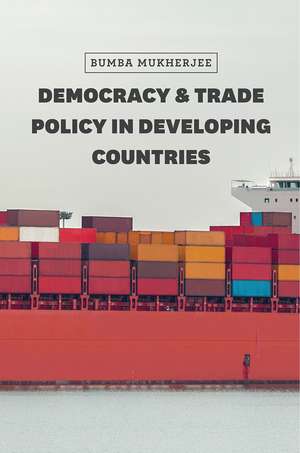Democracy and Trade Policy in Developing Countries: Chicago Series on International and Domestic Institutions
Autor Bumba Mukherjeeen Limba Engleză Paperback – 18 iul 2016
Since the 1970s, two major trends have emerged among developing countries: the rise of new democracies and the rush to free trade. For some, the confluence of these events suggests that a free-market economy complements a fledgling democracy. Others argue that the two are inherently incompatible and that exposure to economic globalization actually jeopardizes new democracies. Which view is correct? Bumba Mukherjee argues that the reality of how democracy and trade policy unravel in developing countries is more nuanced than either account.
Mukherjee offers the first comprehensive cross-national framework for identifying the specific economic conditions that influence trade policy in developing countries. Laying out the causes of variation in trade policy in four developing or recently developed countries—Brazil, India, Indonesia, and South Africa—he argues persuasively that changing political interactions among parties, party leaders, and the labor market are often key to trade policy outcome. For instance, if workers are in a position to benefit from opening up to trade, party leaders in turn support trade reforms by decreasing tariffs and other trade barriers.
At a time when discussions about the stability of new democracies are at the forefront, Democracy and Trade Policy in Developing Countries provides invaluable insight into the conditions needed for a democracy to survive in the developing world in the context of globalization.
Mukherjee offers the first comprehensive cross-national framework for identifying the specific economic conditions that influence trade policy in developing countries. Laying out the causes of variation in trade policy in four developing or recently developed countries—Brazil, India, Indonesia, and South Africa—he argues persuasively that changing political interactions among parties, party leaders, and the labor market are often key to trade policy outcome. For instance, if workers are in a position to benefit from opening up to trade, party leaders in turn support trade reforms by decreasing tariffs and other trade barriers.
At a time when discussions about the stability of new democracies are at the forefront, Democracy and Trade Policy in Developing Countries provides invaluable insight into the conditions needed for a democracy to survive in the developing world in the context of globalization.
Preț: 163.83 lei
Preț vechi: 200.26 lei
-18% Nou
Puncte Express: 246
Preț estimativ în valută:
31.35€ • 32.61$ • 25.88£
31.35€ • 32.61$ • 25.88£
Carte indisponibilă temporar
Doresc să fiu notificat când acest titlu va fi disponibil:
Se trimite...
Preluare comenzi: 021 569.72.76
Specificații
ISBN-13: 9780226358819
ISBN-10: 022635881X
Pagini: 320
Ilustrații: 2 halftones, 36 line drawings, 27 tables
Dimensiuni: 152 x 229 x 18 mm
Greutate: 0.41 kg
Ediția:1
Editura: University of Chicago Press
Colecția University of Chicago Press
Seria Chicago Series on International and Domestic Institutions
ISBN-10: 022635881X
Pagini: 320
Ilustrații: 2 halftones, 36 line drawings, 27 tables
Dimensiuni: 152 x 229 x 18 mm
Greutate: 0.41 kg
Ediția:1
Editura: University of Chicago Press
Colecția University of Chicago Press
Seria Chicago Series on International and Domestic Institutions
Notă biografică
Bumba Mukherjee is associate professor of political science at Pennsylvania State University and a visiting fellow at the University of Notre Dame’s Kellogg Institute For International Studies. He is the coauthor of two books: Democracy, Electoral Systems, and Judicial Empowerment in Developing Countries and The Politics of Corruption in Authoritarian Regimes.
Cuprins
One: Democracy and Trade Policy in Developing Countries
Two: Trade Protection and Electoral Malpractice in New Democratic Regimes
Three: Trade Protection and Electoral Fraud in New Democracies: The Empirical Evidence
Four: Political Particularism and Trade Policy in Developing Democracies
Five: Empirical Tests for Political Particularism, Trade Protection, and Contributions
Six: Democracy, Political Particularism, and Trade Liberalization in Brazil
Seven: Trade Politics and Contributions in India and South Africa
Eight: Conclusion
Appendix: Mathematical Proofs
References
Index
Two: Trade Protection and Electoral Malpractice in New Democratic Regimes
Three: Trade Protection and Electoral Fraud in New Democracies: The Empirical Evidence
Four: Political Particularism and Trade Policy in Developing Democracies
Five: Empirical Tests for Political Particularism, Trade Protection, and Contributions
Six: Democracy, Political Particularism, and Trade Liberalization in Brazil
Seven: Trade Politics and Contributions in India and South Africa
Eight: Conclusion
Appendix: Mathematical Proofs
References
Index
Recenzii
“Why does the impact of democracy vary across developing countries? Mukherjee provides a compelling answer to this important question, moving beyond earlier work to examine variation not only across different regime types but also among democracies with different electoral rules. Democracy and Trade Policy in Developing Countries is a theoretically rigorous and empirically thorough work that is likely to become the leading book on this subject.”
"Develops a theoretical framework with which to address the link between democracy and trade policy in developing countries and to consider the conditions that shape trade barriers, trade reforms, and electoral results, concentrating on Brazil, India, Indonesia, and South Africa."





